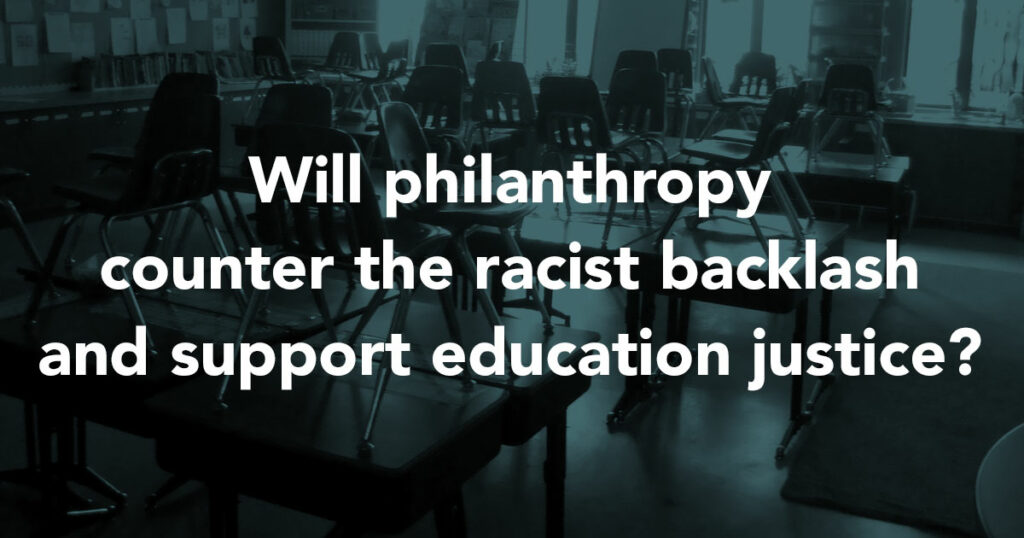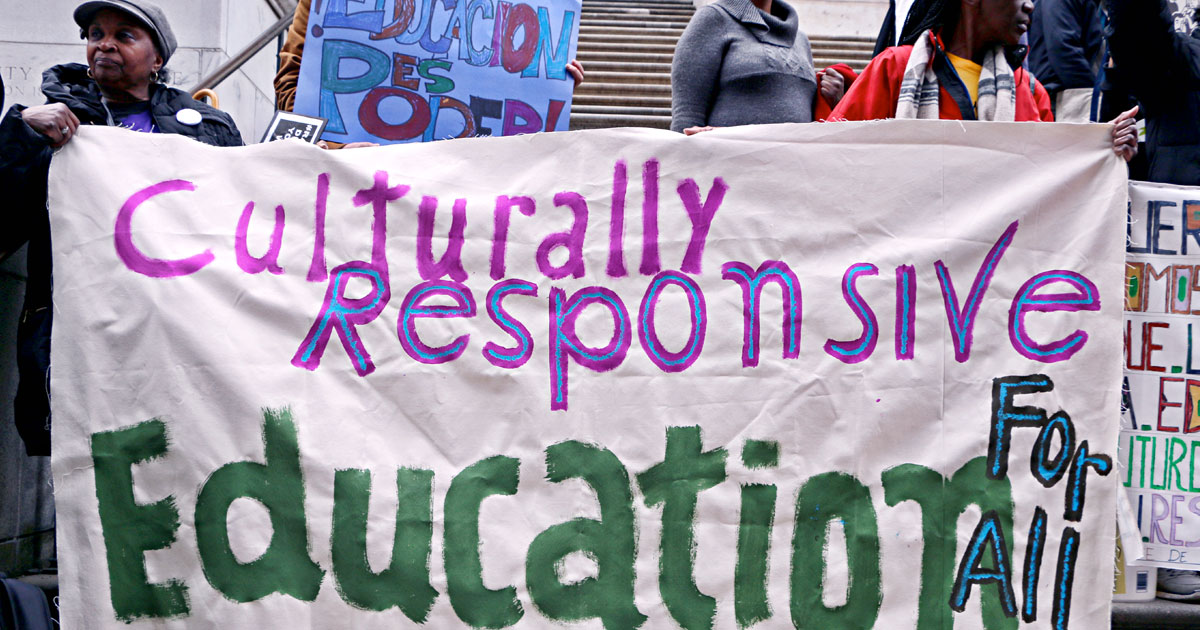Blog
Will philanthropy counter the racist backlash and support education justice?

A rising tide of Black, Brown, and Indigenous community organizing has delivered liberatory and anti-racist education to students across the country over the past decade. Their impressive advances for public school children are now under attack by reactionary forces seeking to foment division and advance their political agendas. The threats are escalating, including legislation in multiple states making it illegal to teach an accurate portrayal of the racial injustice in our nation’s history. At the same time, federal relief dollars are pouring into local school systems and communities are organizing to direct that funding to racial equity and culturally responsive curricula. Education transformation is increasingly possible in this moment, but philanthropy must act quickly and boldly to help realize that potential.
Philanthropy: Responsive curriculum is quality education AND racial justice
 We urge our philanthropic partners to provide immediate and sustaining support to the multiracial movements that have pushed hundreds of schools and districts to center racial equity and culturally responsive curricula. Research tells us that culturally responsive teaching and curricula promote the social, emotional, and academic development of all students. These investments in education justice ensure that students, their lived experiences, and their history are visible and appreciated within their educational environment, which benefits all students.
We urge our philanthropic partners to provide immediate and sustaining support to the multiracial movements that have pushed hundreds of schools and districts to center racial equity and culturally responsive curricula. Research tells us that culturally responsive teaching and curricula promote the social, emotional, and academic development of all students. These investments in education justice ensure that students, their lived experiences, and their history are visible and appreciated within their educational environment, which benefits all students.
One particularly inspiring example is New York City’s Coalition for Education Justice, which has been pushing for “culturally responsive-sustaining education” for more than a decade. In addition to CEJ’s multiracial grassroots parent and youth organizing, support by Schott and other philanthropic partners helped them make significant strides in shifting NYC’s curriculum. The result? New York City’s Department of Education announced this month it will use relief funds to create the Universal Mosaic Curriculum. This culturally responsive curriculum will be designed by educators and the community together and will finally reflect the city’s diversity.
Similar grassroots efforts have demonstrated success across the country but as in New York, much of their work has occurred with limited or no financial support from philanthropy. Without that support, not only have some efforts failed to cross the finish line, but underfunded groups and their communities are finding themselves ill-equipped to resist reactionary rollbacks of the progress they’ve made.
To counter racist attacks on our schools, #JusticeIstheFoundation
With philanthropic support, organizing in communities of color can build the power necessary to advance racial justice and effectively counter the today’s attacks.
Education justice centers on this “on-the-ground” organizing, building the power of the people closest to the problem, so they can transform the systems that generate and reinforce racial injustice, such as curriculum. Racial justice grantmaking in education focuses on building student, parent and community power, cultivating partnership to advance racial equity and achieving policy change.
Racial equity and racial justice grants may look similar on their face, but they are different. Racial equity refers to grants designed to close the achievement gap that persists between racial groups. This includes support for programs like racial bias trainings for teachers or mentorship programs for Black and Brown students.
Racial justice refers to addressing the underlying systemic injustices that create these achievement gaps in the first place.
As Schott details in our #JusticeIsTheFoundation data project, only 0.8% of all K-12 philanthropic dollars are invested in racial justice. This is an opportunity for bold funders to transform the sector and facilitate historic victories for children of color across the country.
When organizers get sustained support and resources, they can accomplish transformative change
Investing in education justice is exactly philanthropy’s business model for impact: employing our limited resources to leverage exponentially larger public investments and systemic change. In New York State, Schott’s early and sustained support of groups like the Alliance for Quality Education meant that organizers recently won a historic victory: an additional $5.5B annually to equitably fund low-income, student of color schools throughout the state.
If it wasn’t clear before, it surely is now: supporting grassroots organizing is our best hope for transformation, offers better returns for quality education and positions us to win this war on racism.
Holding true to the promise of ongoing support
The history of social change in America shows that with every positive step forward there is a reactionary backlash. Many funders stepped up in 2020 to move millions toward movement building, but now that the backlash has begun, what will we do? Will we allow these victories to be rolled back, or will we hold true to our promises of ongoing support?
We urge philanthropy to join us in investing and sustaining these Black, Brown and Native grassroots organizations and leaders who are reimagining a public education system and America for all. That is racial justice.


